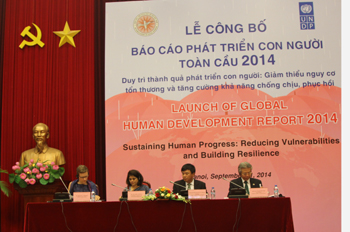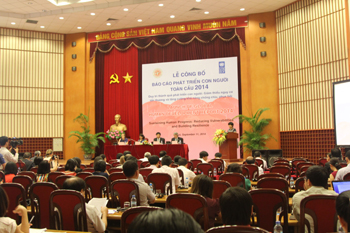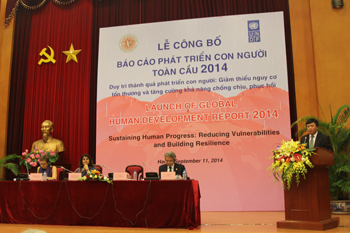On September 11th 2013, Vietnam Academy of Social Sciences (VASS) collaborated with United Nation Development Project (UNDP) to launch the 2014 Human Development Report named “Sustaining Human Progress” Reducing Vulnerabilities and Building Resilience” in Hanoi.
|

|
Orgernizers of the Launching: Prof. Dr. Nguyen Xuan Thang, Prof. Dr. Vo Khanh Vinh, Dr. Pratibha Mehta and Dr. Michaela Krokop |
|
|

|
Overview of the Launching of Global Human Development Report 2014 |
|
Organizers of the Launching are Prof. Dr. Nguyen Xuan Thang – President of VASS, Prof. Dr. Vo Khanh Vinh – Vice President of VASS, Dr. Pratibha Mehta - UN Resident Coordinator and UNDP Resident Representative and Dr. Michaela Krokop – UNDP Economic Policy Advisor. There are representatives of embassies located in Hanoi, development organizations, NGOs and many researchers joined in the launching.
Speaking at the report launch, Dr. Pratibha Mehta highlighted that this was the first time the Global Human Development Report to take into account the vulnerabilities and resilience as well as the recovery under human development perspective. The report showed the major global trending is positive and advanced. There are, however, people who lost their lives due to crisis and natural or human – made disaster. These issues are basically unavoidable for any societies but some of them have ability to reduce the vulnerabilities and have a speedy recovery. In recent years, the progress speed was slowed down; especially the human development index has decreased to 1.5% since 2008. The climate change and increasing conflicts are remarkable factors which could reverse the human development. Report also indicated to four risks which are classified into two groups at systematic and personal level.
|

|
Dr. Pratibha Mehta, UN Resident Coordinator and UNDP Resident Representative having speech at the launching |
|
|

|
Prof. Dr. Nguyen Xuan Thang – President of VASS having speech at the launching |
|
There are many worries about the unstable situations of personal livelihoods and security, environment and global politics. There are more than 15% of world populations who are easy to be in the vulnerabilities due to the multi – dimensional poverty, and most of 80% of global populations do not have the completed social insurance. After a long period of conflicts or facing with the armed violence, many countries, who were in the low index group, are improving their Human Development indexes. The recent instability of politics caused many losses for human so on. The Report recognizes that no matter how effective policies are in reducing inherent vulnerabilities, crises will continue to occur with potentially destructive consequences. Building the ability for disaster preparedness and recovery is required and essential and this will enable public to have a better adaptation and post – shock recovery. At the global level, the report, which is trans-border in nature, ask for collective actions, hence, the report raised a global commitment and a better international management.
In the opening speech, Prof. Dr. Nguyen Xuan Thang pointed that the launching of 2014 Human Development Report is a meaningful and important event. This is also a big effort of UNDP for human in a world full of uncertainness by delivering a message which is not only an encouragement but also a warning to all countries through the report. It suggested the useful ideas for those countries which are facing with challenges of politics, security, and global changes. VASS President Nguyen Xuan Thang said the report is useful for Vietnam at the present, putting forth a new approach on human development with the focus on vulnerability including controlling ability and mechanism. Recommendations will help the VASS fulfill its Vietnam human development report 2014, he added.
Presenting the 2014 Human Development Report, Dr. Michaela Prokop shared the research results and strengthened on 4 rules applied to build and implement the policy in order to reduce the vulnerabilities and improve the resilience:
(1) Embracing universalism: Access to certain and basic social services such as education, health care, water supply and sanitation, and public safety so on to ensure their life chances are equal to others.
(2) Put people first: Reduce the vulnerabilities (by life cycle, structure).
(3) Committing to collective action: The social collectivity is recognized through building the flexible mechanism so that it can improve the resilience of human and provide resources including full employment, chances of health care and education, especially for those who are in poor and vulnerable group.
(4) Coordinating between states and social institutions to fight against natural disasters, to have the regional collaboration for early warnings about disaster to reduce economic losses.
2014 Human Development Report mentioned to the following issues as:
1) Progress of people;
2) Vulnerable people, vulnerable world;
3) Building resilience;
4) Improving steps and collective actions.
The launching has received many comments, ideas and opinions of representatives for the report in which confirmed the reduction of the vulnerability and building of resilience for the progress of human. The report has approached issues related to risk and vulnerability through the human development perspective then fully analyzed this situation. The report also introduced the ideas of life cycle vulnerability and the risks which a person should face with during his life. The report mentioned to the structural vulnerability and its impacts on people who are in poor or minority groups. They are the major reasons of long – lasted poverty and barriers of social progress and human development. Also, the necessarity of building mechanisms and making policies for reducing the life cycle and structural vulnerability is mentioned. The report particularly pointed that there are not only rich countries but also poor ones could have the ability to access to the basic social services.
The report has offered useful suggestions for Vietnam as this country undertakes the 30 – years of Doi Moi as well as builds the long term social economic development plan for next period. Thanks to the Doi Moi progress with significant changes of mechanisms and the equal distribution of resources together other social policies and programs. Especially the policies of health care, education, and poverty reduction have been well implemented for over 30 years; hence, we have expanded more opportunities and improved the ability to use those chances. However, motivations of Vietnam’s sustainable, fast and inclusive growth are heading to its limit range which is slowing down the growth speed in recent 10 years. The declining growth has negative impacts on full employment and quality labor which are the key factors of inclusive growth. These challenges were mentioned to in the Report as the messages of full employment. In Vietnam, challenges are to create quality jobs through motivating 4 types of transition in the job structure. Vietnam is on the progress of completing the social security which is another factor of improving the resilience from shock as report mentioned. In order to have ability to reduce the vulnerability from climate change, Vietnam is implementing solutions to improve the green growth and reduce greenhouse as well as to create more jobs.
Today, Vietnam government has determination with solutions to control inflation and stabilize the macroeconomic. This has significant contribution to reduce risk and the vulnerability of whole economy as well as each enterprises and individuals.
All solutions are to reduce risks and improve the resilience as stated above. They are important contents of the new growth model which Vietnam is building through economic restructure and growth model transformation.
Dr. Pratibha Mehta highlighted that the report discussed new ideas and policy tools in which define the priority as the human vulnerability at both Vietnam and global level.
At the global level, 2014 Human Development Report showed the trans-border risks which require for the collective actions. Therefore, report called a global commitment and a better international management. Dr. Mehta stressed on 6 recommendations for nations’ policies including policies for resilience and the prevention of threats, ability improvement, and human protection, especially those who are easy to have vulnerability. To build the resilience and focus on 5 solutions such as ability to access to basic social services, solutions to life cycle vulnerability, strengthening the social insurance system, improving the full employment, flexible mechanisms and connected societies. Governments should strongly commit to provide the basic services, particularly health care and education which are the foundation of personal and family resilience. Regarding of the life cycle changes, government should apply approaching method from its first state to final stage of life, for example, the most 1000 risky days of a baby from his birth, changes from school to work, from work to retirement. The social supporting system should be considered as the priority of public investment.
Vietnam is a new rising country with the average income. Its achievement is remarkable but there are new risks as a result of migration, urbanization, the ageing population and social changes. There are more and more burdens due to more transactions and integration with global economy but unable to catch up with the economic renewals. The well – located geography actually creates many stresses for Vietnam in geopolitical issues such as East Sea case. Doctor suggested to 4 policy areas on poverty reduction, social – economic development, human capital development and labor market. State has the responsibilities to ensure for poor or vulnerable people the ability to access to basic services, to improve the skills and to join in jobs which generate the actual income. A wide – coverage social protection is vital to ensure the basic ability and livelihoods as well as a completed living standard. This is also the basic factor to fight against the vulnerability. State should have investment to reform the mechanism, to have a better management, to reduce risk and build the capability to reduce the vulnerability. Vietnam is successful in the fight against disaster and climate change but this country should put the improvement of the ability to response the climate change as the priority.
Prof. Dr. Nguyen Xuan Thang has his conclusion for the launching by confirming the 2014 Human Development Report is an alert for all countries with completed contents as the results of many researches and evaluation of group of countries, each nation. The report also discussed the small and big issues in countries which might become the global issues. The report delivered many messages, policy recommendations which could be formed into frameworks and these issues should be deeply discussed in future./.
Nguyen Thu Ha







